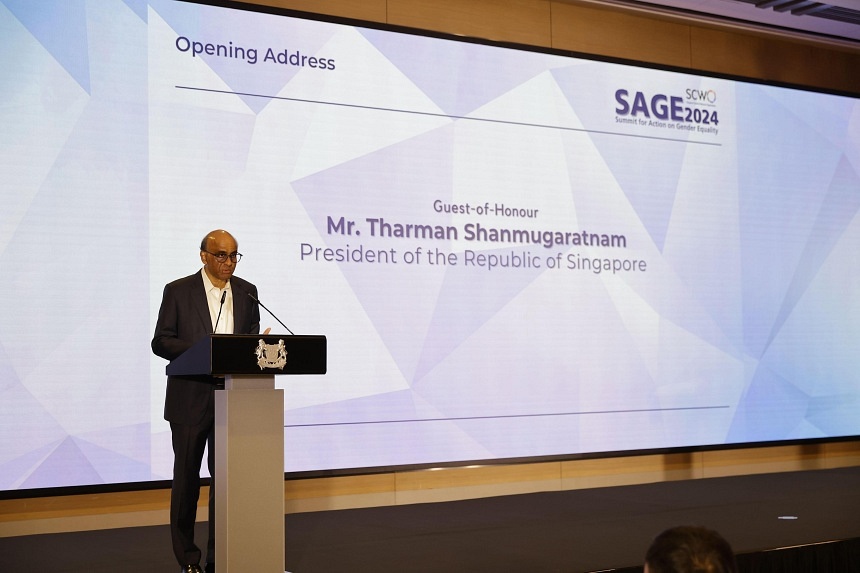SINGAPORE – Helping women to achieve their full potential at work is not a matter of setting quotas to ensure workplace representation, but of avoiding blinkers and recognising the full range of their abilities, said President Tharman Shanmugaratnam.
Speaking at the Singapore Council of Women’s Organisations (SCWO) Summit for Action on Gender Equality on Sept 5, he called on employers to be more family-friendly with flexible work arrangements and to increase women’s representation at senior management levels.
Held at One Farrer Hotel, the first such summit by SCWO – the national coordinating body of women’s organisations in Singapore – was launched in 2024 to lead conversations on how to tackle systemic and personal issues relating to gender equality.
Mr Tharman noted that Singapore fares well internationally on measures of gender equality. It ranked eighth in the latest UN Human Development Report’s Gender Inequality Index, and was the only Asia-Pacific country to make it to the list of top 10 least unequal countries.
Singapore’s adjusted gender pay gap of about 6 per cent – a measure of gaps between women’s and men’s pay after taking into account differences in job roles – is also lower than in the US and Canada, he said.
Mr Tharman said the “glass” of gender equality is “close to full” when it comes to legal rights and protections for girls and women, and “more than half full” with regard to economic empowerment, but added: “We must make the workplace more family-friendly and make further gains in women’s representation at senior management levels.”
But he stressed the wisdom of sticking to a system where people advance on the basis of their merits and what they can contribute. “It is the best way for women themselves, so that they advance without feeling that they got there merely by having ticked a box on diversity. And it is the best way to avoid breeding resentment among men.”
What employers can and should do is pay attention to the full range of abilities women may bring, and avoid measuring them on “only the metrics of achievement that men may be most comfortable with”.
He added that employers can expose female workers to fields outside of those conventional for women in the past – such as advanced manufacturing, technology or quantitative finance – as well as to postings overseas.
“All this is a matter of craft in corporate leadership, not the setting of quotas for women or any other under-represented group.”
“It is the right thing to enable every individual to contribute their most, and not hold them back with glass ceilings or broken rungs in the ladder on the way up,” he added.
About 400 people attended the event, which saw experts discussing obstacles to gender equality in Singapore and Asia in areas such as ageing, caregiving and the gender pay gap.
Ms Alicia Yi, vice-chairwoman of management consulting firm Korn Ferry’s global consumer market, said at a panel discussion on the gender pay gap that companies may not set out to pay women less, but “it’s happening because it’s unconscious; it’s happening because it’s cultural, and it’s happening because women are also not fighting for their worth”.
She cited companies in Europe and the US which disclose pay ranges in their job postings, and others which do not require applicants to share their last-drawn salaries in order not to perpetuate low pay.

